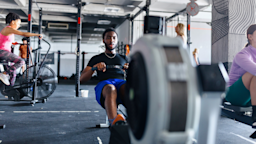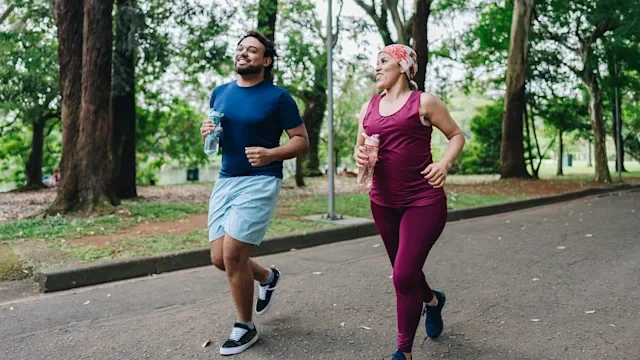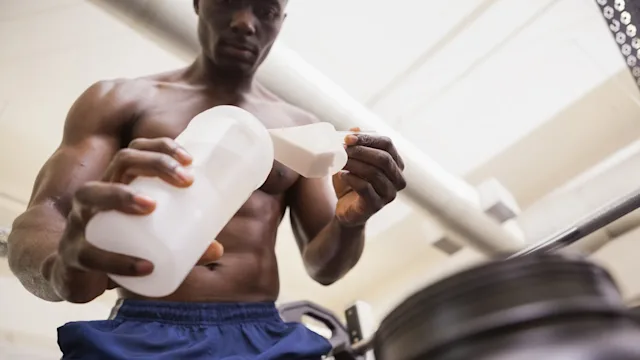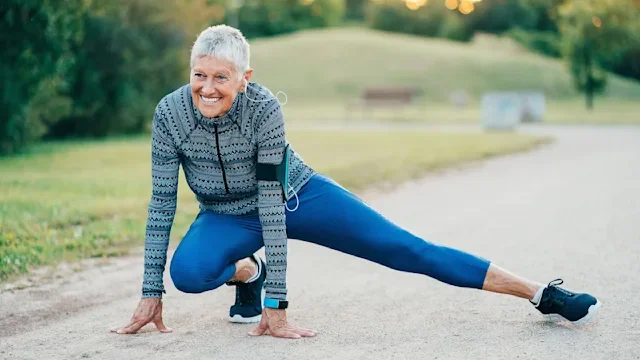Key takeaways:
Both sex and exercise elevate heart rate, burn calories, and relieve stress, among other benefits.
Whether sex counts as exercise may depend on the intensity and duration of the physical activity.
Sex can't replace a consistent exercise routine. Exercise is beneficial for overall health and can make sex more enjoyable.
There are plenty of benefits of an active sex life. In addition to increased pleasure and intimacy, sex may improve sleep quality and relieve stress. But does sex count as exercise too?
It might. Learn more about the benefits of sex, including how many calories it burns and how it affects your health.
Is sex a good workout?
Yes, for the most part. Sexual intercourse is generally considered a light to moderately intense physical activity.
Search and compare options
Sex and exercise share similar attributes. "In most cases, your heart rate elevates, you burn calories, and you can even break a sweat," said Samantha Raddock, a certified sex and intimacy coach in private practice.
But it's tricky to give definitive answers about sex as exercise because people define and experience sex differently. Plus, many studies on the topic are limited to heterosexual couples. So, it's unclear how the findings apply to different sexual activities and relationships.
And although sex is a physical activity, it shouldn’t replace regular exercise.
How many calories does sex burn?
Your calorie burn during sex depends on several factors, including:
Activity intensity
Activity duration
Body weight
Sex
Age
That said, research offers general estimates. One study found that, in men, sex burns an average of 101 calories (4.2 calories per minute). Women, on average, burn 69 calories (3.1 calories per minute). But the researchers noted that sexual activity burned fewer calories than a moderate, 30-minute treadmill run.
Exercise and libido: Find out how exercise can boost your sex drive.
Want to have better sex? Check out these research-backed tips for a better sex life.
Or do you want more pleasurable orgasms? Learn how to have better, more frequent orgasms, according to science.
For comparison, here's how many calories someone who weighs 155 lbs might burn during various 30-minute workouts:
Brisk walking (3.5 mph): 133 calories
Tai chi: 140 calories
Swimming (casual pace): 246 calories
Cycling (12-13 mph): 281 calories
Running (6 mph): 351 calories
Exercise benefits of sexual intercourse
Sex provides many of the same benefits as exercise. Here are some of the exercise-related benefits to expect from sex.
Read more like this
Explore these related articles, suggested for readers like you.
Promotes heart health
Sex boosts your heart rate and may provide a cardio challenge to improve heart health. For young and middle-aged adults, the cardio demands of sex are comparable to climbing two flights of stairs. Over time, this temporary increase in heart rate helps your heart work better.
A healthier heart can lower your risk of heart disease and related complications. One study found that sexually active older women were less likely to have a heart attack, stroke, or other cardiovascular event later in life.
The researchers didn’t find the same association for older men. But older studies have shown that regular sexual intercourse may lower blood pressure and reduce heart disease risk in men.
Sex might qualify as light-to-moderate physical activity. But it won't replace your aerobic workouts. Moreover, the cardio effect can make sex risky for people with heart issues. People with heart disease or other conditions should talk to a healthcare professional about safe sexual activities.
Strengthens pelvic floor
Kegel exercises aren't the only way to strengthen your pelvic floor. Sexual intercourse also helps tone your pelvic floor muscles. These are muscles that support your pelvic organs, including your:
Bladder
Intestines
Urethra
Rectum
Anus
Prostate (in males)
Vagina and uterus (in females)
These organs help you control peeing, pooping, and passing gas. They also play a key role in sexual satisfaction.
A perk of sex is it gives your pelvic floor muscles a workout, helping them get stronger. Research has shown that sexually active women are more likely to have a strong pelvic floor than those who aren’t.
Greater strength can help your pelvic floor do its job better. This makes sex potentially beneficial for people who have a weak pelvic floor. For example, research suggests that orgasms may strengthen pelvic floor muscles in women who have given birth vaginally.
Activates the immune system
Regular exercise may boost the immune system by reducing inflammation and circulating immune cells. Similarly, studies suggest that an active sex life helps the immune system work.
In an older study, people who had sex at least one to two times a week had more germ-neutralizing antibodies than those who had sex less often.
A more recent study found that people who had sex more than three times a month were less likely to develop COVID-19 than those who were less sexually active.
Relieves stress
"Like exercise, sex releases endorphins, which can help with stress or anxiety and promote an overall sense of well-being," Raddock said.
Sexual activity, including masturbation, boosts "feel-good" chemicals like oxytocin that help you relax. Oxytocin is known as the "love hormone" because it makes you feel closer to others. Research suggests oxytocin can also help you cope with stressful situations.
Sex also helps relieve stress by lowering adrenaline and cortisol, two hormones that affect the body's stress response.
Improves sleep
Generally, anything that reduces stress can improve sleep. That's because stress can make it difficult to fall asleep. And regularly clocking fewer than the recommended 7 to 9 hours of sleep can only increase stress.
Fortunately, there are proven strategies to help you log more restful sleep. Sex can help by releasing hormones, such as oxytocin and prolactin, that promote relaxation and sleep. According to one study, having sex — and an orgasm — with a partner may help you fall asleep faster and improve sleep quality.
Can exercise improve sex?
Yes. Given that exercise and sex provide similar benefits, it makes sense that a consistent workout routine can make sex better.
Research shows that men and women who perform higher levels of cardio exercise are less likely to have a sexual dysfunction. For men, that means a lower risk for erectile dysfunction. For women, regular cardio workouts may keep their sexual arousal and satisfaction high.
"Exercise can increase circulation and blood flow, which is helpful to achieve arousal states," Raddock explained. "It increases energy levels as well, which can help you sustain stamina for long love-making sessions."
A workout routine may also improve your self-confidence and sex drive, leading to more desire and pleasure. Try aiming for the following expert recommendations for exercise:
Moderate-intensity aerobic exercise, 150 minutes per week
Full-body strength workouts, two per week
The bottom line
Sex and exercise offer many of the same benefits. Both promote heart health, relieve stress, and boost libido. Sex may count as light or moderate physical activity. But sexual activity can't replace exercise. Consistent exercise can even make sex more enjoyable. So, make both activities a regular part of your routine.

Why trust our experts?



References
American Council on Exercise. (n.d.). Physical activity calorie counter.
American Psychological Association. (2013). Stress and sleep.
Bhat, G. S., et al. (2022). Sexually induced orgasm to improve postpartum pelvic floor muscle strength and sexual function in primiparous women after vaginal delivery: A prospective randomized two-arm study. The Journal of Sexual Medicine.
Brody, S. (2010). The relative health benefits of different sexual activities. The Journal of Sexual Medicine.
Centers for Disease Control and Prevention. (2023). Adult activity: An overview.
Charnetski, C. J., et al. (2004). Sexual frequency and salivary immunoglobulin A (IgA). Physiological Reports.
Fergus, K. B., et al. (2019). Exercise improves self-reported sexual function among physically active adults. The Journal of Sexual Medicine.
Fuss, J., et al. (2017). Masturbation to orgasm stimulates the release of the endocannabinoid 2-arachidonoylglycerol in humans. The Journal of Sexual Medicine.
Kanter, G., et al. (2015). A strong pelvic floor is associated with higher rates of sexual activity in women with pelvic floor disorders. International Urogynecology Journal.
Levine, G. N., et al. (2012). Sexual activity and cardiovascular disease: A scientific statement from the American Heart Association. Circulation.
Liu, H., et al. (2016). Is sex good for your health? A national study on partnered sexuality and cardiovascular risk among older men and women. Journal of Health and Social Behavior.
Nieman, D. C., et al. (2018). The compelling link between physical activity and the body's defense system. Journal of Sport and Health Science.
Oesterling, C. F., et al. (2023). The influence of sexual activity on sleep: A diary study. Journal of Sleep Research.
Oliva-Lozano, J.M., et al. (2022). What are the physical demands of sexual intercourse? A systematic review of the literature. Archives of Sexual Behavior.
Ramadhan, M. A., et al. (2021). The effects of sexual frequency and immune boosting mineral intake on immune status in COVID-19 susceptible individuals. Fertility and Sterility.
Takayanagi, Y., et al. (2021). Roles of oxytocin in stress responses, allostatis, and resilience. International Journal of Molecular Sciences.
















